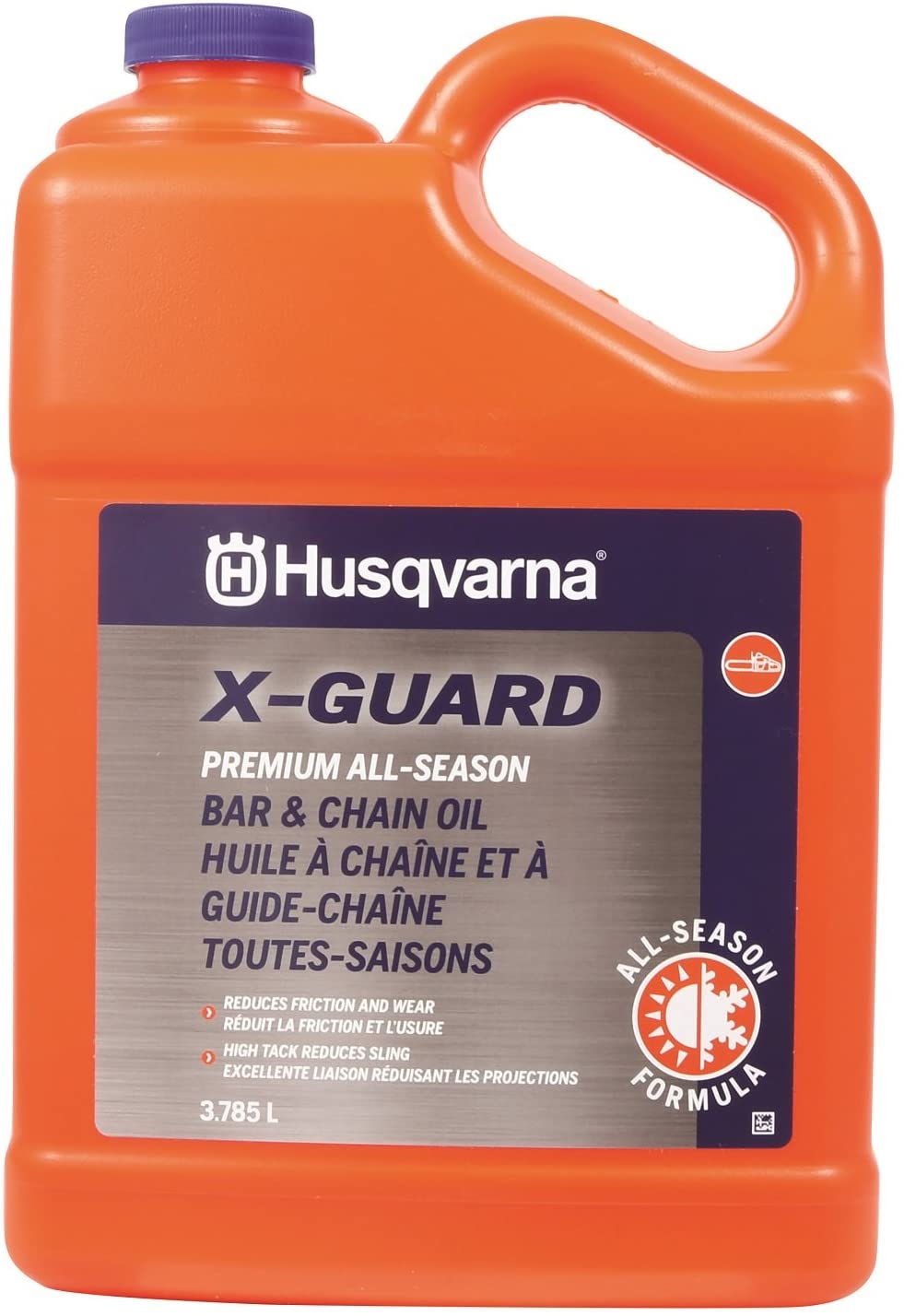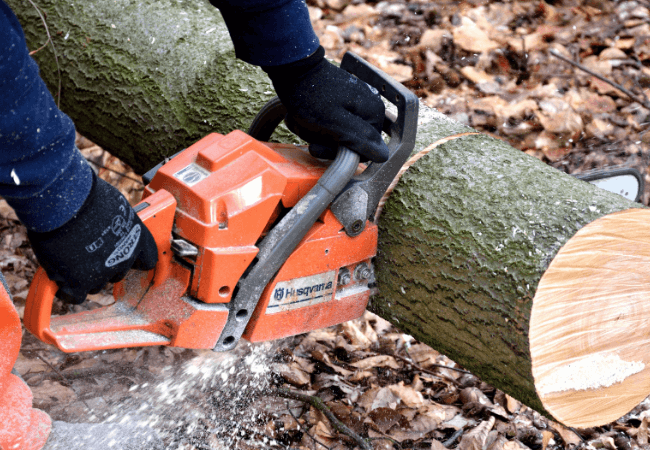- Home
- Chainsaw Maintenance
- Chainsaw Oil
Chainsaw Oil
This post may contain affiliate links so I earn a commission.
What's the best chainsaw oil to use in your new or used chainsaw?
That's a common question many people who heat with wood have.
Even if you’re more on the experienced side, knowing what options you have for chainsaw bar oil is essential, as it can really help you out in a pinch.
Here are some tips on finding the right oil to fit your needs.
What Types Of Chainsaw Oil Can You Use?
Standard Oil
Before you do anything else (or Google anything else!) check the user manual for your chainsaw.
It will tell you if there is a specific brand (and product number) recommended for your specific make and model of saw.
When given the choice, you should always use the bar and chain oil that is recommended by your manufacturer.
Why?

Certain chainsaw bars and chains need lubricants with certain properties to help the parts run as smoothly as possible.
Chains spin at high speeds, so it’s essential that the bar oil be adhesive enough to remain on the chain as it continues to spin.
If it’s not sticky enough, it can come off the chain and lead to friction against the bar.
This can cause damage to your chainsaw.
For best results, therefore, use the standard chainsaw oil that is recommended by your user manual.
You can also use replacement oils that are acceptable for your specific saw.
Motor Oil
There are some common substitutions you can use for chainsaw bar oil when your usual pick isn’t around.
While the proper bar and chain oil is definitely recommended over any substitution, there are some options you can consider - and motor oil is one of them.
Motor oil isn’t the greatest substitute for bar and chainsaw oil, since it’s not sticky enough to stay on your chain and your bar.
You will have to be careful using it, as it can come off as you are cutting and create quite the mess.
Motor oil can also be damaging to the environment.
Since it doesn't stay on a chainsaw well, it’s more likely to stick to trees and other vegetation.

You'll find that your saw goes through motor
oil quite quickly too, particularly when compared to using standard bar and
chain oil.
The upside to using motor oil?
It’s readily available, and you’re likely to have it around the house. It’s a good, quick fix if you’re in a pinch.
Hydraulic Oil
Hydraulic oil is another potential substitute.
Like motor oil, you can use it if you’re in a pinch and don’t have any bar and chain oil around.
The one advantage to hydraulic oil over motor oil is that it dries up faster than motor oil, so you won’t have as many problems with it flying all over the place.
However you will have to use more of it in one shot to keep your chain and your bar adequately lubricated.
Vegetable Oil
Vegetable oil by far is the most readily available oil around. If you cook - even just a small amount! - you probably have a bottle of vegetable oil in your kitchen cupboards.
It is thinner and has a lower viscosity than both hydraulic and motor oil, so it’s more environmentally-friendly.

However, although it’s better for the environment, you’ll have to constantly refill to keep up with your cutting.
It wears out super fast.
Canola Oil
Canola oil is another option that works similarly to vegetable oil.
On the plus side, it can handle high heat (it is commonly used for frying, after all) and can help protect your bar and chain, at least temporarily, from friction.
It is also a good alternative if you’re cutting in the winter.
Although it’s one of the best substitutions for high temperatures, it also holds up well to the cold.
Fill Your Chainsaw Without Making A Mess - Easy Hack
Chances are if you've tried to fill your chainsaw with bar oil you've spilled it everywhere....especially if you're using a gallon jug.
So how can you easily fill up your bar oil without making a mess?
Here's an easy solution!
An old 1 gallon liquid Tide laundry detergent bottle or Era jug that has the push valve at the bottom works perfectly.
I just unscrew the cap and use a funnel to add a gallon of chainsaw bar oil to the used 1 gallon detergent tub.
Obviously you'll want to make sure you clean out any excess detergent, but the bottle will last for years.
I don't recommend using the jug for fuel because it can eat away at the jug, but they work perfectly for chainsaw oil.
How To Mix 2 Cycle Oil Into Gas
When you’re adding standard bar and chain oil to your chainsaw, you’ll quickly learn that chainsaw engines aren’t necessarily the same as other types of engines.
You need to use a mixture of gasoline and oil to help your saw function properly.
Most chainsaws, along with string trimmers, pole saws, brushcutters, leaf blowers, and other kinds of equipment, run with a two-stroke engine.
These engines require that a mixture of oil and fuel be added to the tank for proper lubrication and combustion.
If you only use gasoline, your engine will suffer.
To figure out the proper mixing ratio for your chainsaw, you will need to check when and by whom your saw was manufactured.
Check your user manual for specific ratios and instructions.

However, as a general rule of thumb, know that equipment made prior to 2003 requires a 32:1 gasoline to oil ratio.
For
equipment manufactured after this date, you'll want to use a mixture at a ratio
of 40:1.
Pour the oil into an empty gasoline can before adding a gallon of fresh gasoline.
You don’t need to shake or otherwise agitate the mixture, but always use fresh gas to prevent potential problems.
If you plan on storing the mixture for more than a month or so, you may want to use a fuel stabilizer to increase the shelf life of the mixture.
Also, as a side note, you may want to avoid using gasoline with an ethanol content higher than 10%, as it attracts moisture when it is exposed to air.
The longer you have the mixture sitting in your gas can, the more disastrous the results can be for your engine’s carburetor.
What's The Best Chainsaw Oil
Keep in mind that if you use motor oil (or any of the other substitutes besides standard bar and chain oil), they aren’t necessarily approved by chainsaw manufacturers.
Therefore, they can void your warranty.
If you use these substitutes in the long term without eventually filing your chainsaw with standard chainsaw oil, some long term damage can occur.
So, you should only use motor oil or any of these other substitutes when you absolutely have to - and only for a short period of time.
Ultimately, the best chainsaw oil for your saw is going to be the one that is recommended by your manufacturer.
However, feel free to use any of the selections above for a brief period - but only if you’re in a pinch!

About the Author
Obsessed with firewood, Nick is behind over 350+ of Firewood For Life's articles, as well as countless reviews, guides and YouTube videos to help readers like you reduce heating costs and create the perfect fire.


